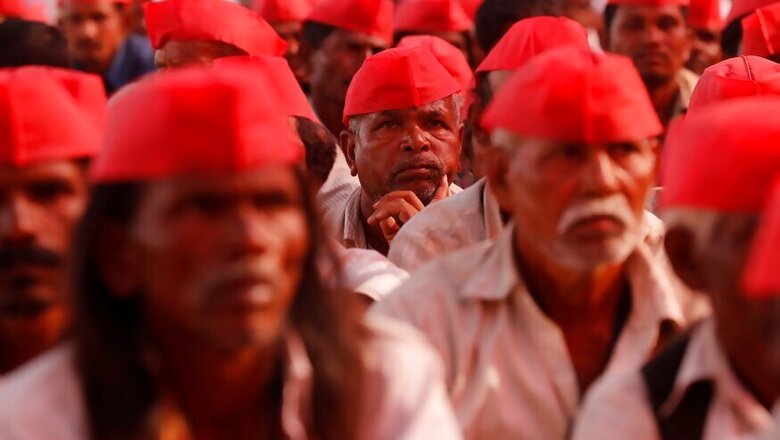
views
Days before the climate summit starts in Katowice, Poland on Monday - with around 200 countries participating in it - a protest march by more than 100,000 farmers rang an alarm bell at the heart of country for the Indian government once again. Led by farmers and civil society groups and supported by opposition political parties this protest attacked the government for ignoring peasants and adopting anti farmer policies.
However, this congregation and protest of farmers at capital - demanding the enactment of legislation to give them debt waiver and assurance of a fair minimum support price (MSP) - can be a guiding light for Indian negotiators in Poland, where the stage is set for tough bargain between developing and developed world.
As farmers congregated from across the country raised placards with angry messages and shouted slogans against government, many of them gave testimony how they have got trapped in debt cycle. The extreme weather events have compounded the problems of farmers manifold in recent times as crops fail again and again due to frequent drought, floods and unseasonal rains.
For example, farmers in Karnataka had to suffer both drought and floods together this year. “This was a peculiar situation for us. As southern part of our state was flooded, more than 100 talukas in north (Karnataka) were facing severe drought. Borewell dried down at many places and there was no drinking water. Farmers didn’t have even fodder for their cattle. Agriculture labourers are left with no work and they are migrating from villages to cities every day. Meanwhile the banks are issuing notices to farmers for recovery of money (which they have borrowed” says 60 years old farmer Chamarasa Mali Patil who had come from Raichur to participate in the farmer’s agitation in New Delhi.
Even Prime Minister Narendra Modi had acknowledged last year that “climate change” and “altered weather cycles” are making “big negative impact” on agriculture and life of farmers. “Life goes completely topsy-turvy as a result of floods. Crops, livestock, infrastructure, roads, electricity, communication links – everything gets affected. In particular, our farmer brethren have to bear a lot of losses because of the damage to their crops and fields” Modi had said in 2017 in his radio interaction with people called Maan Ki Baat.
Now as PM Modi grapples with farmers’ demands which has put his government at a tight spot, India’s negotiators can strategically exploit this agrarian crisis in Poland conference to build pressure on developed countries. “The extreme weather events induced by climate change are hurting our economy and hitting the poor and our farmer is the poorest in the social and economic structure. More the temperature will rise more such extreme weather events due to climate change will occur and this will hit agriculture across the country. So, India should take a leadership role in Poland to build pressure on rich nations to increase their mitigation targets.” says Chandra Bhushan, deputy director general of Center for Science and Environment (CSE).
The main agenda of the Poland climate summit is to finalise a rule book to govern the historic Paris agreement signed by all the nations of world in 2015. The Paris deal comes into effect from the year 2020 under which nations have committed to take steps to prevent global warming to save the world from the disastrous effects of climate change.
The share of agriculture has steadily decreased in India’s GDP (it contributes around 17% in India’s GDP) in last 60 years. Nevertheless it employs more than half of countries populations in this sector. As Kavita Kuruganti the convener of Alliance for Sustainable and Holistic Agriculture (ASHA) advocates for climate resilient agriculture adopting organic farming which make farmers self-reliant, a Delhi based climate change research firm Climate Trends has come out with a report this week saying that more frequent and intense rainstorm will bring more flooding. The report also warns that India’s sensitivity to shifting rainfall patterns threatens more drought in near future.
The recent floods in Kerala have shown that how disastrous the impact of flooding can be as the economic losses from the 2018 floods in Kerala alone exceeded the total damage from all flooding in India last year. It also reduced real GDP growth in the state by 1%. The farmers were among the most impacted by this flood.
The report says that monsoon rain fall has been decreasing for last 150 years, with rainfall outside the monsoon increasing slightly, balancing the annual average. According to the report some states in India have seen big changes in annual rainfall.
For instance, in Chhattisgarh the annual rainfall has fallen nearly 10%, while it has increased in Coastal Karnataka, Punjab and Haryana. Extreme rainfall is becoming more common in much of the country. The report warns that India will be the hub of extreme poverty by 2030 if the effects of climate change are not dealt with urgently.
Experts feel that India should focus on safeguarding the interest of its farmers and agriculture in Poland with a proactive and aggressive approach. This will require a concerted effort and strategy by Indian negotiators with other countries of developing world.
Incidentally, several countries in Asia, Africa and Indian subcontinent share the similar geographical condition as India has and face the wrath of increasing natural disaster the same way. For example, in August 2017, heavy monsoon rains caused widespread flooding across India, Bangladesh and Nepal, leading to at least 1,200 deaths. This shared whammy provides India a great opportunity to muster up support to build pressure on rich nations.
PM Modi has envisioned to double the income of farmers by 2022. But it won’t be possible until India deals with the problem of climate change. Recent report by Intergovernmental Panel on Climate Change (IPCC) has underlined the urgency of limiting the earth temperature rise under 1.5º C. Cutting emissions is the way and India will have to put pressure on rich nations in Poland if it doesn’t want its farmers and future generations to suffer food insecurity, malnutrition and poverty.
(This story is the first in News18’s four-part series on the UN climate summit in Poland.)


















Comments
0 comment